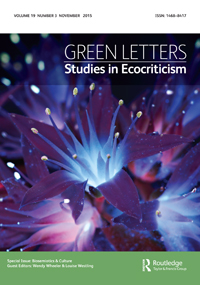The online platform for Taylor & Francis Group content
Green Letters: Studies in EcocriticismVolume 19, Issue 3, 2015Special Issue: Biosemiotics and Culture |
|||


Articles
Objective reality and the physical world: relation as key to understanding semiosis
- DOI:
- 10.1080/14688417.2015.1063239
pages 267-279
- Received: 15 Jan 2015
- Accepted: 22 Apr 2015
- Published online: 05 Aug 2015
Abstract
Understanding relation in the reality of its suprasubjective character independently of awareness is the conditio sine qua non for achieving an understanding of semiosis. The present article takes us from Augustine’s original fourth-century proposal of signum as a general notion transcending the boundaries of nature and culture, through the thirteenth-century realization in Roger Bacon’s generation that concepts (both perceptual and intellectual) are signs formally, to John Poinsot’s demonstration of the irreducibly triadic character of sign relations. The suprasubjective relational essence of sign as based on the singularity of relation as being indifferent to realization in awareness is precisely what explains how one and the same sign-relation can pass from awareness-independent to awareness-dependent being, and conversely, due solely to the circumstances of its terminus. This understanding of semiosis is opposed to the Ockhamist denial of relation taken up by the mainstream moderns, as also to the misleading modern synonymy of ‘object’ and ‘thing’. Charles Peirce’s introduction of the notion of interpretant as not necessarily mental further opens the way to understanding how semiosis extends to the whole of nature. Contrary to the Saussurean notion that anthroposemiosis is the whole story of sign action, realizing that the Interpretant as third term in semiosis need not be a cognitive term opens the way to understanding how semiosis occurs in both plants (‘phytosemiosis’) and physical nature (‘physiosemiosis’), as well as among all animals (generically ‘zoösemiosis’) and human animals (species-specifically ‘anthroposemiosis’). Nevertheless, we will see that only in anthroposemiosis is there an awareness of relations in their difference from relata, underpinning Thomas Sebeok’s crucial distinction between ‘language’ and ‘linguistic communication’, and Jacques Maritain’s observation that while all animals use signs only human animals can come to know that there are signs by virtue of the capacity to objectify relations in their uninstantiability to sense.
Keywords
Related articles
View all related articlesDetails
- Received: 15 Jan 2015
- Accepted: 22 Apr 2015
- Published online: 05 Aug 2015
Author affiliations
- a Department of Philosophy, University of St. Thomas, Houston, TX, USA
Author biographies
John Deely is currently Philosopher in Residence at the Benedictine College and Seminary, Saint Vincent, in Latrobe, Pennsylvania. He was a close associate with Thomas A. Sebeok in the 1975 founding of the Semiotic Society of America (SSA) and in the development of the SSA Annual Yearbook since 1970. Central among his many books is Four Ages of Understanding, a history of the place of semiotics within philosophy from the seventh-century BC to the present.
Video Interview
An interview with Greg Garrard and John Parham, Editors of Green Letters: Studies in Eco-criticism
- Watch the video | vimeo.com
- Read the transcript | pdf
Librarians
- Librarians' area
- Pricing
- Institutional account
- Access entitlements
- Co-branding
- IP ranges
- Link resolver preferences
- Usage reports




